Melatonin is produced in the pineal gland, located deep in the brain and which was considered a possible receptacle for the soul in the early stages of neuroanatomy.
This molecule has been the subject of numerous studies since the 80s and, little by little, we’ve been finding out the surprising effects it has. These are not just limited to sleep, but throughout the body. We could even stretch to say that sleep improvement plays a secondary role to the rest of the benefits.
Dr. Iván Moreno – Neolife Medical Team
Now we’re going to look at the different benefits melatonin has.
This recently discovered molecule (1958), has been the subject of numerous studies since the 80s and, little by little, we’ve been finding out the surprising effects it has. These are not just limited to sleep, but throughout the body. We could even stretch to say that sleep improvement plays a secondary role to the rest of the benefits.
Melatonin is produced in the pineal gland, located deep in the brain and which was considered a possible receptacle for the soul in the early stages of neuroanatomy. There is melatonin in many species of animals and plants, which shows its basic importance in the metabolism of living beings.
High concentrations of melatonin have been found in the retina, gastrointestinal tract, bone marrow, skin and other tissues. We can therefore deduce that it may have an influence on other physiological functions through local secretion and that, far from being just a sleeping aid, melatonin has multiple effects throughout the body, including:
- Regulating the different biological clocks of the body: biological neural clocks are adjusted in cycles more or less approximate to the duration of the day (22-26 hours), but the other daily cycles of the organism such as hepatic metabolism, renal, oxidative stress, body temperature and muscle toning have less accurate clocks so they require internal synchronization. That is why when we suffer jetlag, we’re not only tired, but we feel almost sick – our body does not work properly.
- Control of oxidative stress: melatonin plays a key role in promoting the excellent health of mitochondria and an adequate control of oxidative stress.
- Prevention of dementia.
- Maintenance of the optimal neuronal state.
- Others…
The secretion of melatonin is influenced by external light through the optic nerve. This means nature allows us to synchronize with seasonal changes.
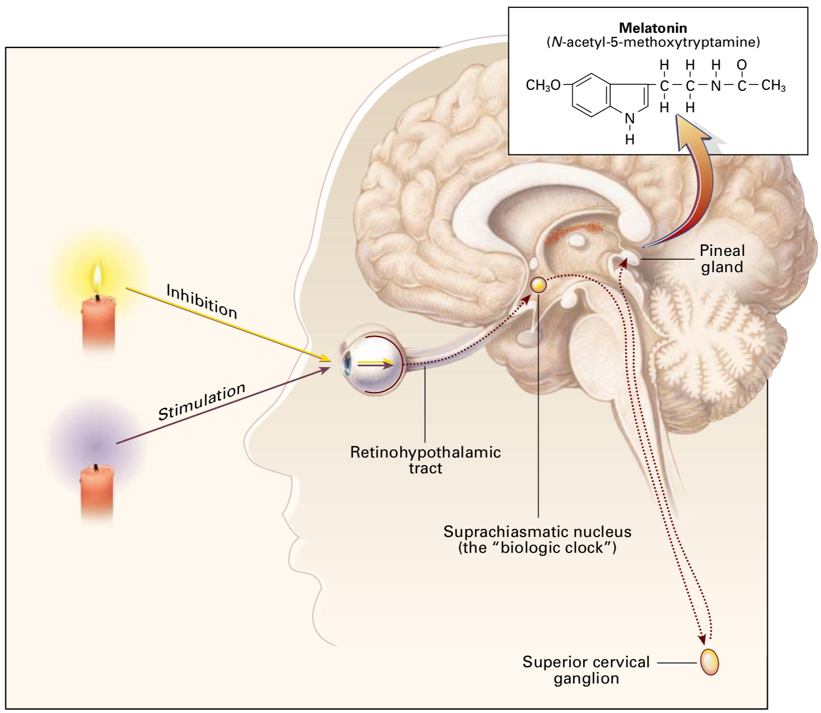
Each of us has a particular predisposition for melatonin secretion, the most frequent being the average that begins producing melatonin at around 8:00 in the evening and peaks about 2:00-3: 00 in the morning.
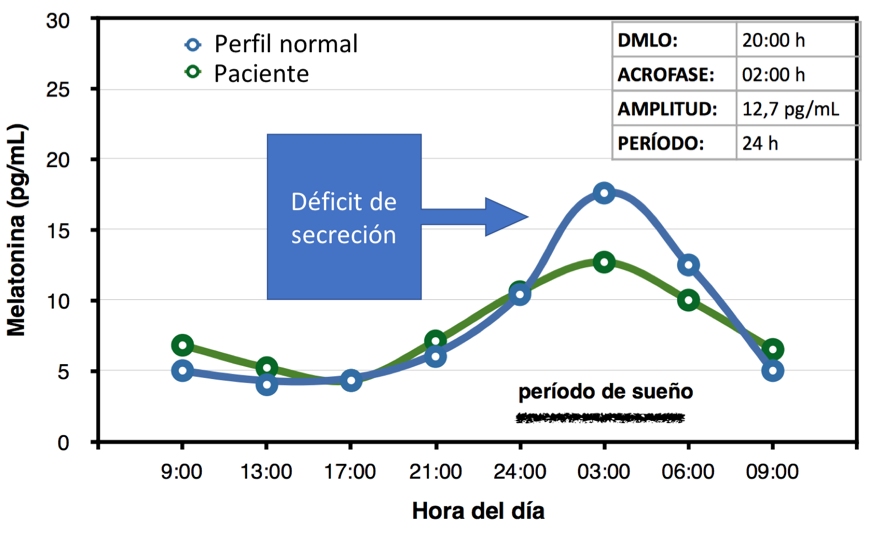
Quite often we find, when studying the secretion profile, a lack of coordination and insufficient secretion.
These phase imbalances and deficits in the total effect of melatonin cause the appearance of chronobiotic rhythm alterations, imbalance and oxidative stress, etc.
As we age, melatonin secretion drops in quality, resulting in imbalances of the circadian cycles and quantity thereof (figure attached).
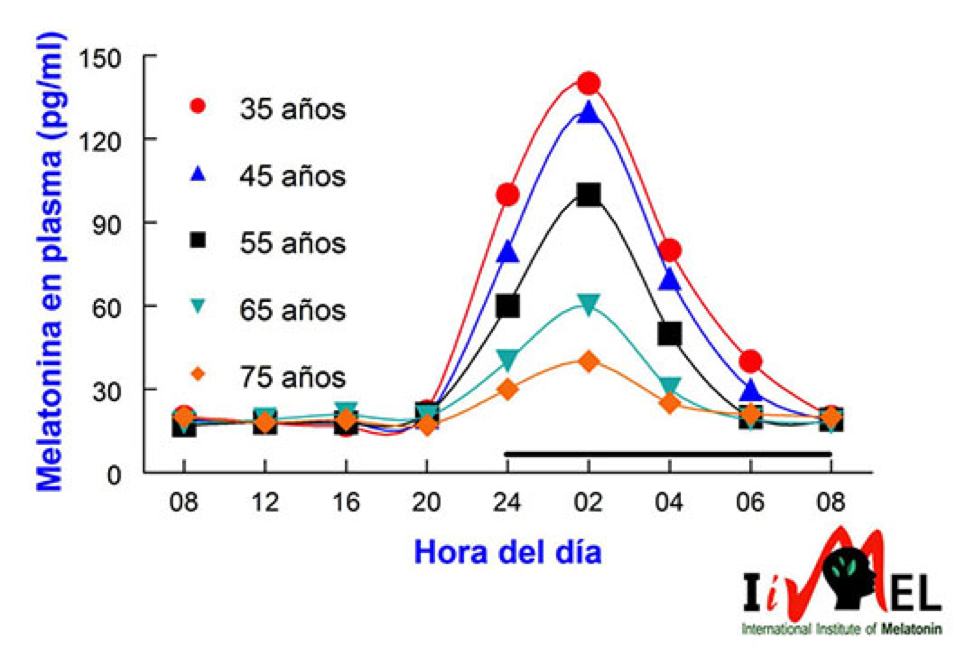
Although the doses normally found in supplements are around 2mg, these doses are too small to reach all tissues and serve the different purposes that melatonin has. In addition, in case of using an incorrect dose we can produce the opposite effect (insomnia or de-regulation), which is why taking melatonin supplements without measuring precisely normally only goes well for some people while others report insomnia and discomfort.
At Neolife we advocate taking high doses of melatonin, which have the maximum beneficial effects, but at a personalized dose and at a specific time which will be most beneficial (and which will avoid side effects). For this reason, in collaboration with the International Institute of Melatonin, we conducted studies of melatonin profiles and oxidative stress to be able to prescribe melatonin and antioxidants properly.
Age Management Medicine Group
Recently at the annual meeting of the AMMG in Orlando, Florida, attended by part of the Neolife medical team, results from several studies were presented which showed an antineoplastic effect from high doses of melatonin. In this post we want to review some of the most important ideas that were presented:
-
- There is no such thing as “high doses” of melatonin. Melatonin has been shown to be extremely safe and toxic levels of it have not yet been shown. This does not mean that we can take high doses without conducting a previous study, as even if we do not have to avoid the toxicity, we still need to pay attention to the balance of the system.
- Exposure to blue spectrum light is the most related to the secretion of melatonin. To secrete melatonin, you do not need to sleep, you only need to be in the dark. Professor Ritter went on to say that light at night “is a drug” in relation to the harmful effects it has. This is of extreme importance as the secretion of melatonin and the preparation for an adequate night’s rest begins hours before going to bed (normally at 08:00pm). Maintaining good sleep hygiene and adapting screens to avoid blue light is essential to preserve our melatonin secretion as long as possible.
- Melatonin and all its metabolites have a powerful effect by capturing free radicals, which are highly toxic and damage DNA, leading to degenerative, autoinflammatory and oncological diseases. It has been seen in different studies that there is a higher incidence of cancer in workers on night shift, or with alterations in the important hourly rhythms (many transoceanic journeys). In fact, light at night is included as a carcinogen by the World Health Organization.
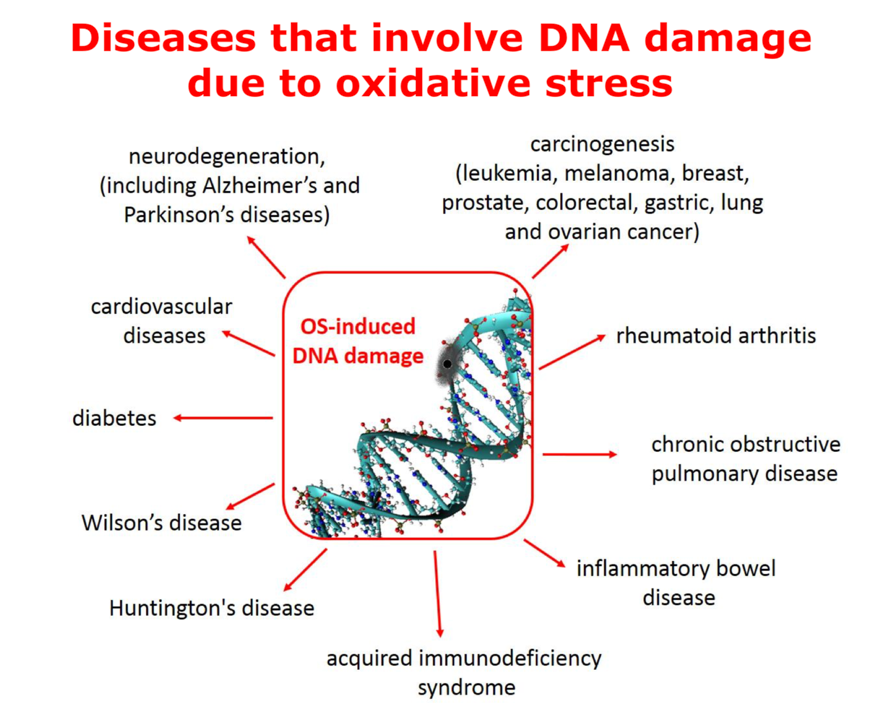
- There is strong scientific evidence that shows that tumors appear, develop and metastasize more easily in subjects exposed to night light that prevents correct melatonin secretion.
- Melatonin inhibits many of the mechanisms that cancer cells use (Hanahan, 2011) and improves sensitivity to chemotherapy.
Following this excellent presentation and reviewing the relationship of melatonin with the appearance of tumors, specifically the breast, in greater depth we have found important scientific evidence that supports this relationship in human studies, showing a clear benefit in prevention and even by adding melatonin to the oncological treatment of breast tumors.
In an extensive review published in the journal Critical Reviews in Oncology last year, it was concluded that there is considerable evidence to support the multiple tumor suppressive effects of melatonin, showing a protective effect against chemotherapy and antitumor of melatonin, especially through its anti-gonadotropin and antiestrogenic effect on the breast tumor.
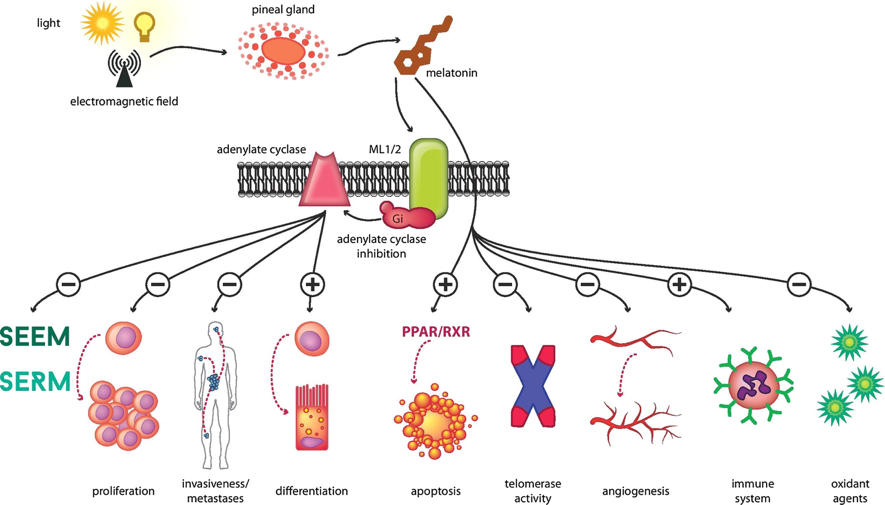
Due to its low toxicity even in high doses and the full range of benefits that it seems to have shown, melatonin can be considered as a complementary therapy to usual chemo and radiotherapy and in prevention of breast cancer in women with a history of risk or mammary fibrocystic disease.
So then, beyond the benefits for quality of sleep, melatonin is a true antiaging molecule, while allowing vital systems to continue optimum functioning and delaying the appearance of diseases – exactly what Age Management medicine and Neolife are about.
BIBLIOGRAPHY
(1) Kubatka P, Zubor P, Busselberg D, Kwon TK, Adamek M, Petrovic D, et al. Melatonin and breast cancer_ Evidences from preclinical and human studies. Critical Reviews in Oncology / Hematology. Elsevier; 2018 Jan 8;122:133–43.
(2) Majidinia M, Reiter RJ, Shakouri SK, Research IMA, 2018. The multiple functions of melatonin in regenerative medicine. Elsevier.
(3) Shirani A, JCSM ELJOCSM, 2009. Illuminating rationale and uses for light therapy. Journal of Clinical Sleep Medicine.
